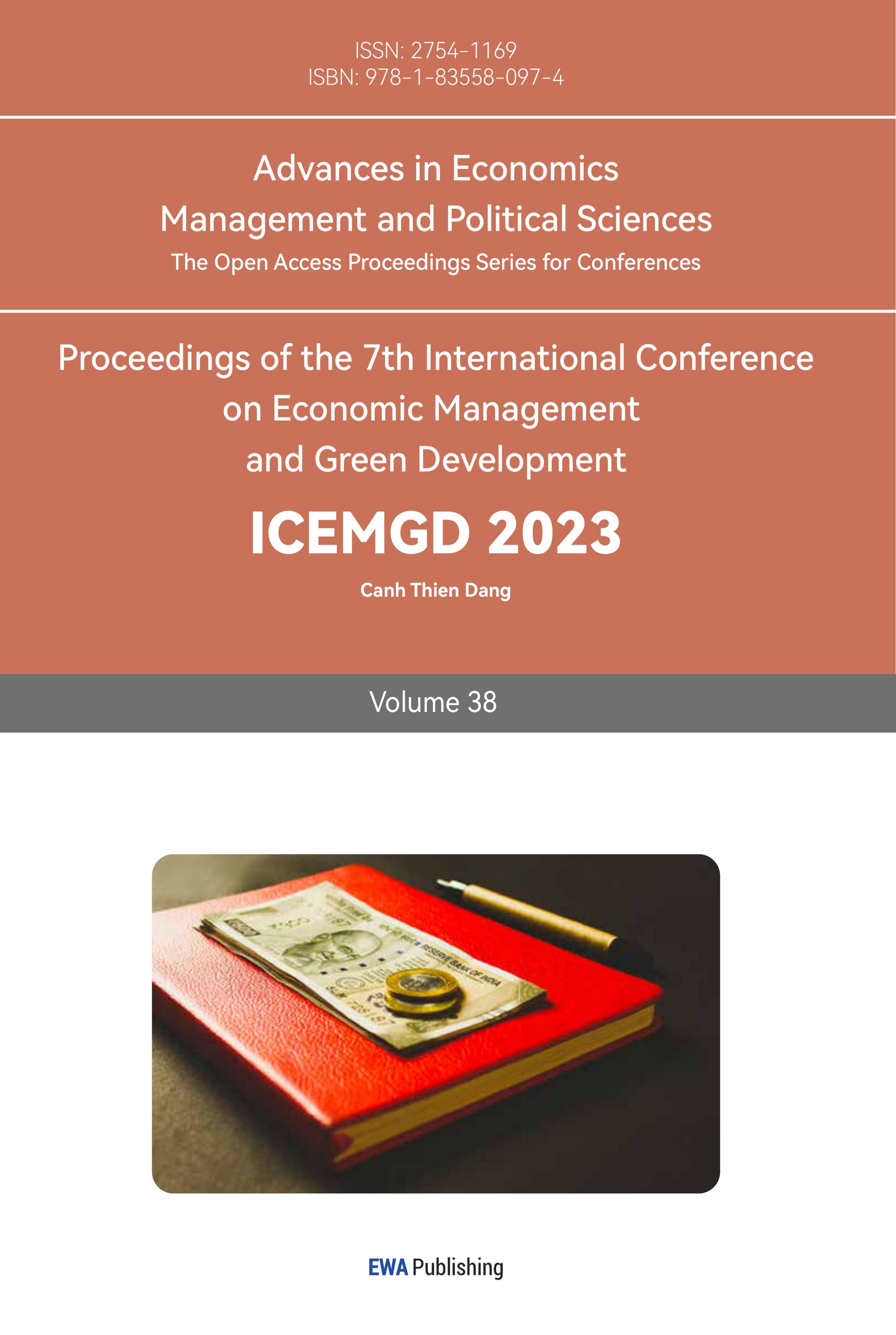References
[1]. Adrian Furnham, A., Boo, H. C.: A literature review of the anchoring effect. The Journal of Socio-Economics, 40(1), 35-42 (2011).
[2]. Matsumoto, A. S., Fernandes, J. L., Ferreira, I., Chagas, P. C.: Behavioral finance: a study of affect heuristic and anchoring in decision making of individual investors. Available at SSRN 2359180, (2013).
[3]. Brewer, N. T., Chapman, G. B.: The fragile basic anchoring effect. Journal of Behavioral Decision Making, 15(1), 65-77 (2002).
[4]. Cervone, D.: Effects of envisioning future activities on self-efficacy judgments and motivation: An availability heuristic interpretation. Cognitive Therapy and Research, 13, 247-261 (1989).
[5]. Book, L. A., Tanford, S., Chen, Y. S.: Understanding the impact of negative and positive traveler reviews: Social influence and price anchoring effects. Journal of Travel Research, 55(8), 993-1007 (2016).
[6]. Strack, F., Mussweiler, T.: Explaining the enigmatic anchoring effect: Mechanisms of selective accessibility. Journal of personality and social psychology, 73(3), 437 (1997).
[7]. Cho, I., Wesslen, R., Karduni, A., Santhanam, S., Shaikh, S., Dou, W.: The anchoring effect in decision-making with visual analytics. In 2017 IEEE Conference on Visual Analytics Science and Technology (VAST), pp. 116-126 (2017).
[8]. Winkelmann, R.: Conspicuous consumption and satisfaction. Journal of economic psychology, 33(1), 183-191 (2012).
[9]. Mason, R.: Conspicuous consumption: A literature review. European journal of Marketing, 18(3), 26-39 (1984).
[10]. Lee, J., Shrum, L. J.: Conspicuous consumption versus charitable behavior in response to social exclusion: A differential needs explanation. Journal of Consumer Research, 39(3), 530-544 (2012).
Cite this article
Zhang,R. (2023). The Influence of Quantitative Restriction on the Quantity of Purchases under Anchoring Effect. Advances in Economics, Management and Political Sciences,38,141-146.
Data availability
The datasets used and/or analyzed during the current study will be available from the authors upon reasonable request.
Disclaimer/Publisher's Note
The statements, opinions and data contained in all publications are solely those of the individual author(s) and contributor(s) and not of EWA Publishing and/or the editor(s). EWA Publishing and/or the editor(s) disclaim responsibility for any injury to people or property resulting from any ideas, methods, instructions or products referred to in the content.
About volume
Volume title: Proceedings of the 7th International Conference on Economic Management and Green Development
© 2024 by the author(s). Licensee EWA Publishing, Oxford, UK. This article is an open access article distributed under the terms and
conditions of the Creative Commons Attribution (CC BY) license. Authors who
publish this series agree to the following terms:
1. Authors retain copyright and grant the series right of first publication with the work simultaneously licensed under a Creative Commons
Attribution License that allows others to share the work with an acknowledgment of the work's authorship and initial publication in this
series.
2. Authors are able to enter into separate, additional contractual arrangements for the non-exclusive distribution of the series's published
version of the work (e.g., post it to an institutional repository or publish it in a book), with an acknowledgment of its initial
publication in this series.
3. Authors are permitted and encouraged to post their work online (e.g., in institutional repositories or on their website) prior to and
during the submission process, as it can lead to productive exchanges, as well as earlier and greater citation of published work (See
Open access policy for details).
References
[1]. Adrian Furnham, A., Boo, H. C.: A literature review of the anchoring effect. The Journal of Socio-Economics, 40(1), 35-42 (2011).
[2]. Matsumoto, A. S., Fernandes, J. L., Ferreira, I., Chagas, P. C.: Behavioral finance: a study of affect heuristic and anchoring in decision making of individual investors. Available at SSRN 2359180, (2013).
[3]. Brewer, N. T., Chapman, G. B.: The fragile basic anchoring effect. Journal of Behavioral Decision Making, 15(1), 65-77 (2002).
[4]. Cervone, D.: Effects of envisioning future activities on self-efficacy judgments and motivation: An availability heuristic interpretation. Cognitive Therapy and Research, 13, 247-261 (1989).
[5]. Book, L. A., Tanford, S., Chen, Y. S.: Understanding the impact of negative and positive traveler reviews: Social influence and price anchoring effects. Journal of Travel Research, 55(8), 993-1007 (2016).
[6]. Strack, F., Mussweiler, T.: Explaining the enigmatic anchoring effect: Mechanisms of selective accessibility. Journal of personality and social psychology, 73(3), 437 (1997).
[7]. Cho, I., Wesslen, R., Karduni, A., Santhanam, S., Shaikh, S., Dou, W.: The anchoring effect in decision-making with visual analytics. In 2017 IEEE Conference on Visual Analytics Science and Technology (VAST), pp. 116-126 (2017).
[8]. Winkelmann, R.: Conspicuous consumption and satisfaction. Journal of economic psychology, 33(1), 183-191 (2012).
[9]. Mason, R.: Conspicuous consumption: A literature review. European journal of Marketing, 18(3), 26-39 (1984).
[10]. Lee, J., Shrum, L. J.: Conspicuous consumption versus charitable behavior in response to social exclusion: A differential needs explanation. Journal of Consumer Research, 39(3), 530-544 (2012).









